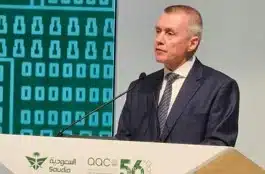Aviation industry boss Willie Walsh has urged international governments to become more committed to the decarbonisation of the airline industry and the building of its sustainable future.
He said the use of Sustainable Aviation Fuel (SAF) will be key to the cleaning of the industry and that decarbonisation remains an achievable goal by 2050. However, he warned the industry can’t do it alone and needs more government help.
Mr Walsh – the director general of aviation industry group the International Air Transport Association (IATA) – said: “Aviation’s decarbonisation requires governments to be equally committed. Agreeing to a Long Term Aspirational Goal through ICAO that mirrors the industry’s net zero by 2050 goal is not enough. We need a policy framework to support success.”
Speaking, this week, at the 2023 AGM of the Arab Air Carriers Organisation (AACO), in Saudi Arabia, Mr Walsh said: “Decarbonising our industry is a huge challenge. But getting to net zero CO2 by 2050 will secure our future and that is a great opportunity—albeit not an easy one to achieve.
“Once again, we can learn from Europe and the mistakes that they are making in this critical area. Suppressing growth and pricing flying to a point that is beyond the reach of the majority of Europeans, may appear an attractive option for the political elite in Brussels but it ignores the massive economic contribution that aviation makes and the opportunity that aviation represents in other parts of the world.”

In his keynote speech, Mr Walsh added: “We believe that it is possible and credible to decarbonise our industry while continuing to facilitate its growth and economic contribution. The various roadmaps that we published earlier this year outlining the path to net zero, confirm our longstanding assumption that Sustainable Aviation Fuels (SAF) will be the major contributor to the industry’s decarbonisation. We estimate that SAF will account for about 62% of the decarbonisation that we will need.
“Considering that it accounts for far less than 1% of our fuel needs today, there is some scepticism that we will make it. I’ve always said that it will not be easy but let’s also remember that we will be playing a very different hand come 2050. Today, the production of SAF mainly uses one pathway – HEFA – but it is very clear that more are possible. Pushing forward the use of additional production pathways with maximum use of various sustainable feedstock opportunities is the priority.”
Mr Walsh said the good news is that airlines have already done a lot to get the ball rolling on SAF usage.
“Importantly, airlines have already sent a huge demand signal to encourage the needed diversification of investments in SAF production. Even though prices are 2-3 times higher than jet kerosene, every drop of SAF available in 2022 was purchased—at a cost of almost $500 million. The same will be true for 2023. And the determination of airlines participating in our recent SAF readiness workshop in this region indicated that airlines will be prepared when SAF stocks are available at scale,” he told the conference.


